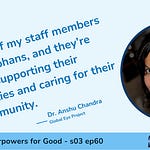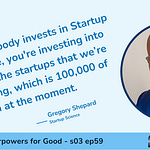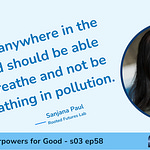Devin: Abhi, what do you think of as your superpower?
Abhi: Devin, I have no idea... What is my superpower? Something I’ve heard often is actually the ability to have these kinds of open, hard, vulnerable conversations with people and see that turn into something meaningful for the other person and myself.
“Just because this person is wearing a hat that has the opposite message of what I believe doesn’t mean that we can’t have a meaningful conversation,” says Abhi Nangia, founder of BetterWorldEd.org. “As I learn about this person’s story, there’s a chance that I’ll start seeing this person differently.”
That philosophy, incorporating empathy and respect for another’s innate humanity, underlies Abhi’s vision for education. He believes you can teach math, reading, writing and science in a way that also guides students to appreciate people whose lives are different than their own.
The BetterWorldEd.org program is built around wordless videos introducing students to a person in a place or circumstance different from their own.
For instance, one video features Shantanu in India, who makes and sells chai tea. The wordless video provides an intimate look at his daily life, smiling, laughing, talking to customers and listening to music. It provides students with an opportunity to step into his world briefly.
Based on the video, written narratives then provide teachers and students with a structure for considering math and literacy lessons. Those lessons stick close to traditional lessons for teaching those concepts, but the context is profoundly refreshing.
Abhi saw a problem with conventional approaches to education. “Show me the experiences we’re having where kids are really learning to wonder about each other, to care about each other. Practicing that in school is really not happening at any kind of scale with any kind of depth,” he observed.
The videos are intended to help address that educational gap while keeping teachers and students on track with the fundamentals.
Abhi believes the shift can be genuinely transformational, helping students and ultimately humankind cope with climate change, social upheavals and global health. “If we want to have a shot at actually addressing all of these huge, massive systemic problems, it’s going to take everybody working together.”
Abhi’s superpower, reluctant as he is to acknowledge it, “the ability to have these kinds of open, hard, vulnerable conversations” is fundamental to his work.
How to Develop Authentic Communication As a Superpower
It isn’t hard to see how Abhi’s rare ability to build trust and rapport that gain him and his team access to people’s private lives is critical to BetterWorldEd.org’s success. “We make these stories about people all over the world, and we have video footage of people brushing their teeth, [or] praying in a situation where they’ve never let anybody into that room with them to pray,” he said.
At the same time, it appears that Abhi didn’t set out to develop this skill. Perhaps it grew out of his humility. As our conversation about his superpower concluded, at my invitation, he encouraged the audience to connect with him, adding this explanation:
And just to note on the superpower thing to remember, I feel like for me, I don't even know if it's a superpower, it's something I'm just trying to do better. And so for whoever is listening, if we do connect, I would love to work on it together, too. I'm no expert. I feel like I'm far from understanding how to do this really well. So I would appreciate people helping me figure this out better, too.
His open nature makes every day, every minute, a teachable moment for him.
He’s also learned that to help people reveal themselves authentically, he must be willing to do the same. And he regularly does. “Is it weird that I’m open to having a two-hour discussion with somebody I just met at a cafe about some of the hardest things going on in my life?”
His unusual willingness to share openly gives others license to respond similarly.
He and his team have learned to rely on this approach. One aspect that has become a formal part of their approach is to avoid any hint of ulterior motive. Their goal as a team is just to learn about a person. Abhi says, “We just live it.”
“We just have these conversations and dig into the things, and with each other and with the people we’re making stories about to the point that just naturally keeps growing. And it’s contagious.”
So, as you seek to build your authentic communication skills, remember that practice is essential. Abhi says, “The only way to cultivate this kind of superpower is to just keep doing it even when it’s uncomfortable.”
If you work at it, authentic communication could become a superpower that enables you to do more good in the world.














